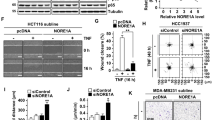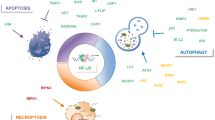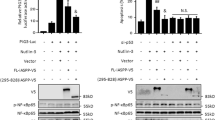Abstract
We recently reported that nuclear factor-kappa B (NF-κB) promotes DNA damage-triggered apoptosis in glioblastoma, the most common brain tumor. In the present study, we investigated the role of NF-κB in death receptor-mediated apoptosis. Here, we identify a novel pro-apopotic function of NF-κB in TRAIL- and CD95-induced apoptosis. Inhibition of NF-κB by overexpression of the dominant-negative IκBα-superrepressor (IκBα-SR) significantly decreases tumor necrosis factor (TNF)-related apoptosis-inducing ligand (TRAIL)- or CD95-induced apoptosis. Vice versa, activation of NF-κB via overexpression of constitutively active IκB kinase complex (IKK)β (IKK-EE) significantly increases TRAIL-mediated apoptosis. Intriguingly, NF-κB inhibition reduces the recruitment of Fas-associated death domain and caspase-8 and formation of the death-inducing signaling complex (DISC) upon stimulation of TRAIL receptors or CD95. This results in reduced TRAIL-mediated activation of caspases, loss of mitochondrial potential and cytochrome c release in IκBα-SR-expressing cells. In comparison, NF-κB inhibition strongly enhances TNF-α-mediated apoptosis. Comparative studies revealed that TNF-α rapidly stimulates transcriptional activation and upregulation of anti-apoptotic proteins, whereas TRAIL causes apoptosis before transcriptional activation. Thus, this study demonstrates for the first time that NF-κB exerts a pro-apoptotic role in TRAIL- and CD95-induced apoptosis in glioblastoma cells by facilitating DISC formation.
This is a preview of subscription content, access via your institution
Access options
Subscribe to this journal
Receive 50 print issues and online access
$259.00 per year
only $5.18 per issue
Buy this article
- Purchase on Springer Link
- Instant access to full article PDF
Prices may be subject to local taxes which are calculated during checkout




Similar content being viewed by others
References
Ammann JU, Haag C, Kasperczyk H, Debatin KM, Fulda S . (2009). Sensitization of neuroblastoma cells for TRAIL-induced apoptosis by NF-kappaB inhibition. Int J Cancer 124: 1301–1311.
Campbell KJ, Rocha S, Perkins ND . (2004). Active repression of antiapoptotic gene expression by RelA(p65) NF-kappa B. Mol Cell 13: 853–865.
DeAngelis LM . (2001). Brain tumors. N Engl J Med 344: 114–123.
Doi TS, Marino MW, Takahashi T, Yoshida T, Sakakura T, Old LJ et al. (1999). Absence of tumor necrosis factor rescues RelA-deficient mice from embryonic lethality. Proc Natl Acad Sci USA 96: 2994–2999.
Farhana L, Dawson MI, Fontana JA . (2005). Apoptosis induction by a novel retinoid-related molecule requires nuclear factor-kappaB activation. Cancer Res 65: 4909–4917.
Fulda S, Debatin KM . (2006). Extrinsic versus intrinsic apoptosis pathways in anticancer chemotherapy. Oncogene 25: 4798–4811.
Furnari FB, Fenton T, Bachoo RM, Mukasa A, Stommel JM, Stegh A et al. (2007). Malignant astrocytic glioma: genetics, biology, and paths to treatment. Genes Dev 21: 2683–2710.
Humphreys RC, Halpern W . (2008). Trail receptors: targets for cancer therapy. Adv Exp Med Biol 615: 127–158.
Kang S, Park SY, Lee HJ, Yoo YH . (2010). TRAIL upregulates decoy receptor 1 and mediates resistance to apoptosis in insulin-secreting INS-1 cells. Biochem Biophys Res Commun 396: 731–735.
Karin M, Cao Y, Greten FR, Li ZW . (2002). NF-kappaB in cancer: from innocent bystander to major culprit. Nat Rev Cancer 2: 301–310.
Karl S, Pritschow Y, Volcic M, Hacker S, Baumann B, Wiesmuller L et al. (2009). Identification of a novel pro-apopotic function of NF-kappaB in the DNA damage response. J Cell Mol Med 13: 4239–4256.
Kohlhaas SL, Craxton A, Sun XM, Pinkoski MJ, Cohen GM . (2007). Receptor-mediated endocytosis is not required for tumor necrosis factor-related apoptosis-inducing ligand (TRAIL)-induced apoptosis. J Biol Chem 282: 12831–12841.
Mader I, Wabitsch M, Debatin KM, Fischer-Posovszky P, Fulda S. . (2010). Identification of a novel proapoptotic function of resveratrol in fat cells: SIRT1-independent sensitization to TRAIL-induced apoptosis. Faseb J 24: 1997–2009.
Mattson MP . (2005). NF-kappaB in the survival and plasticity of neurons. Neurochem Res 30: 883–893.
Micheau O, Tschopp J . (2003). Induction of TNF receptor I-mediated apoptosis via two sequential signaling complexes. Cell 114: 181–190.
Pennarun B, Meijer A, de Vries EG, Kleibeuker JH, Kruyt F, de Jong S . (2010). Playing the DISC: turning on TRAIL death receptor-mediated apoptosis in cancer. Biochim Biophys Acta 1805: 123–140.
Plantivaux A, Szegezdi E, Samali A, Egan L . (2009). Is there a role for nuclear factor kappaB in tumor necrosis factor-related apoptosis-inducing ligand resistance? Ann NY Acad Sci 1171: 38–49.
Poppelmann B, Klimmek K, Strozyk E, Voss R, Schwarz T, Kulms D . (2005). NF{kappa}B-dependent down-regulation of tumor necrosis factor receptor-associated proteins contributes to inte. J Biol Chem 280: 15635–15643.
Radhakrishnan SK, Kamalakaran S . (2006). Pro-apoptotic role of NF-kappa B: implications for cancer therapy. Biochim Biophys Acta 1766: 53–62.
Ravi R, Bedi GC, Engstrom LW, Zeng Q, Mookerjee B, Gelinas C et al. (2001). Regulation of death receptor expression and TRAIL/Apo2L-induced apoptosis by NF-kappaB. Nat Cell Biol 3: 409–416.
Shou Y, Li N, Li L, Borowitz JL, Isom GE . (2002). NF-kappaB-mediated up-regulation of Bcl-X(S) and Bax contributes to cytochrome c release in cyanide-induced apoptosis. J Neurochem 81: 842–852.
Trauth BC, Klas C, Peters AM, Matzku S, Moller P, Falk W et al. (1989). Monoclonal antibody-mediated tumor regression by induction of apoptosis. Science 245: 301–305.
Zhao X, Laver T, Hong SW, Twitty Jr GB, Devos A, Devos M et al. (2011). An NF-kappaB p65-cIAP2 link is necessary for mediating resistance to TNF-alpha induced cell death in gliomas. J Neurooncol 102: 367–381.
Acknowledgements
We thank R Marienfeld (Ulm, Germany) for providing NEMO knockout mouse embryonic fibroblasts. This work has been partially supported by grants from the Deutsche Forschungsgemeinschaft, European Community (ApopTrain, APO-SYS) and IAP6/18 (to SF), and by a scholarship of the International Graduate School of Molecular Medicine Ulm University (to CJ).
Author information
Authors and Affiliations
Corresponding author
Ethics declarations
Competing interests
The authors declare no conflict of interest.
Additional information
Supplementary Information accompanies the paper on the Oncogene website
Supplementary information
Rights and permissions
About this article
Cite this article
Jennewein, C., Karl, S., Baumann, B. et al. Identification of a novel pro-apoptotic role of NF-κB in the regulation of TRAIL- and CD95-mediated apoptosis of glioblastoma cells. Oncogene 31, 1468–1474 (2012). https://doi.org/10.1038/onc.2011.333
Received:
Revised:
Accepted:
Published:
Issue Date:
DOI: https://doi.org/10.1038/onc.2011.333
Keywords
This article is cited by
-
Involvement of the tumour necrosis factor receptor system in glioblastoma cell death induced by palbociclib-heptamethine cyanine dye conjugate
Cell Communication and Signaling (2024)
-
Marizomib sensitizes primary glioma cells to apoptosis induced by a latest-generation TRAIL receptor agonist
Cell Death & Disease (2021)
-
β-catenin promotes MTX resistance of leukemia cells by down-regulating FPGS expression via NF-κB
Cancer Cell International (2020)
-
Serum deprivation initiates adaptation and survival to oxidative stress in prostate cancer cells
Scientific Reports (2020)
-
Necroptosis in microglia contributes to neuroinflammation and retinal degeneration through TLR4 activation
Cell Death & Differentiation (2018)



